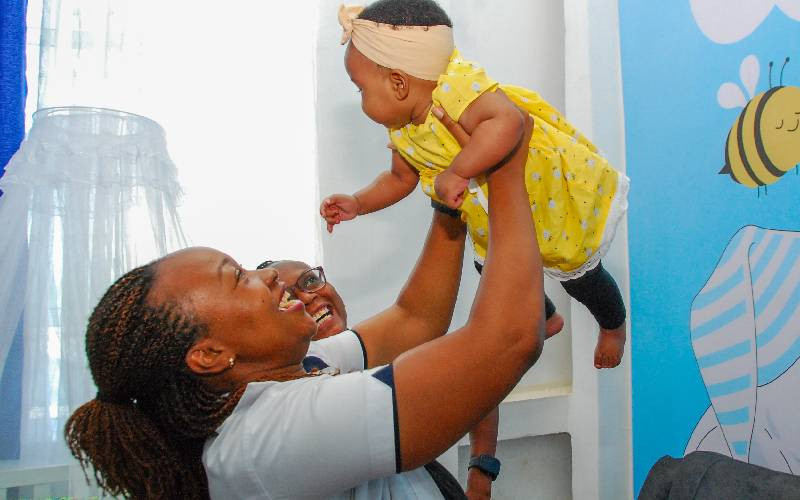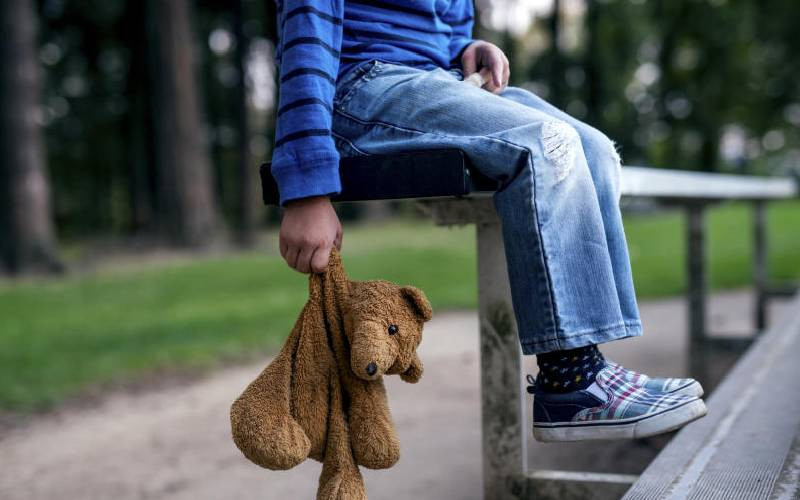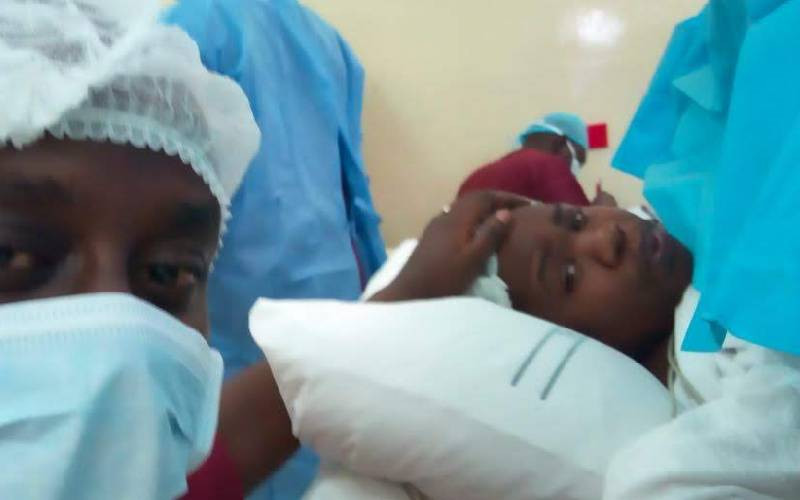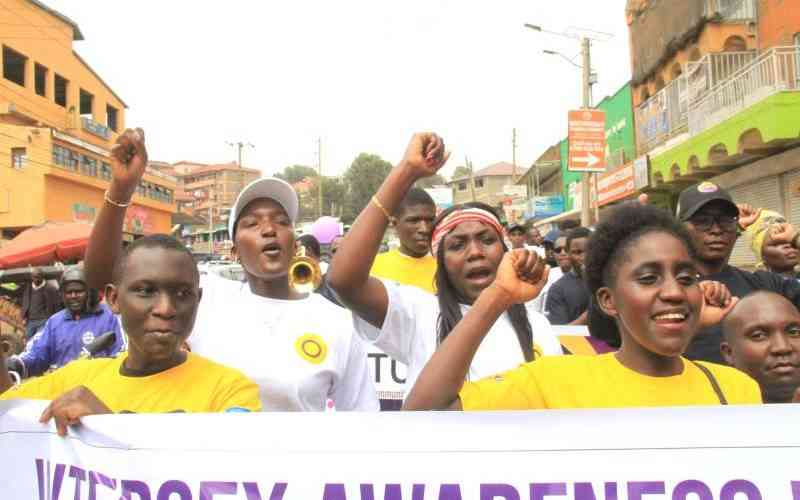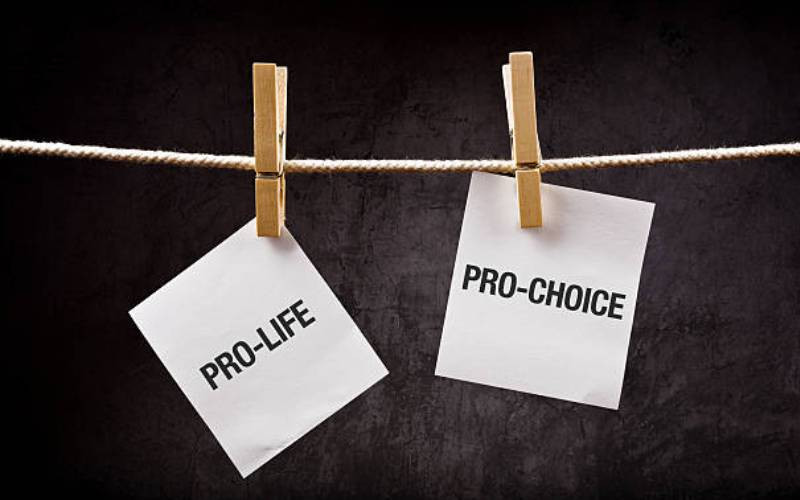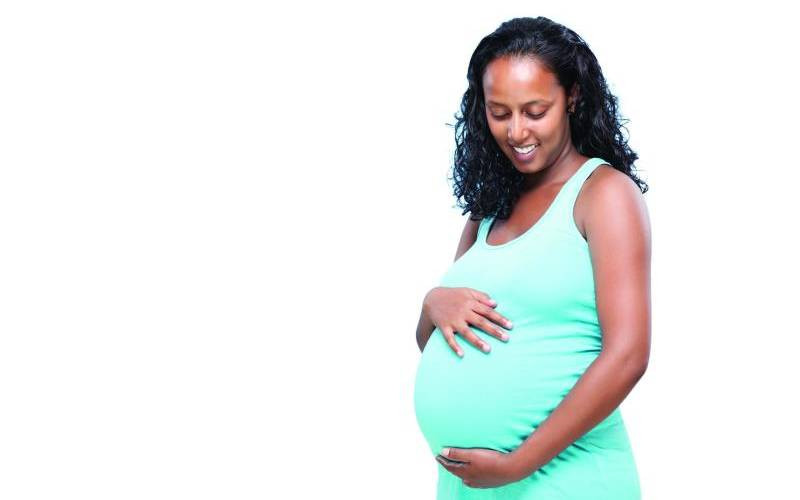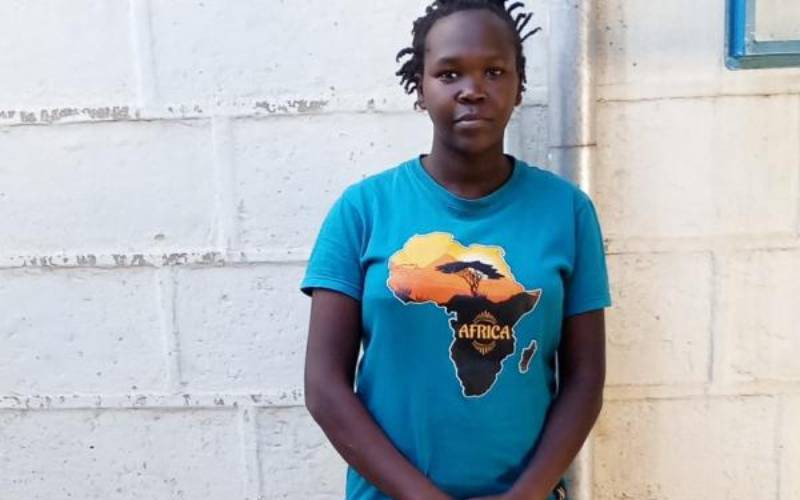
Ivy Amdany, a resident of Baringo County, lives with fibroids. [Rodgers Otiso, Standard]
When Ivy Amdany started her period in the early years of adolescence, she experienced the usual mixed feelings -- a celebration of the important transition to womanhood, a little fear of embarrassment from accidentally soiling her clothes and concern over what was normal and what wasn't.
But as the months went by, she became accustomed to taking care of herself during that time of the month and she went out to conquer the world -- at least the world of academia.
Until one day when she was in Form Two when she realised, she had not had her period that month or the month before. When another month went by, she sought advice from her friends who told her that it happened to them sometimes so she didn't think much of it after that.
"This was the first time experiencing it so I assumed it was normal," Ivy says.
A year later, her period returned with unbearable pain and discomfort.
"The flow of my menses was light but it was accompanied by stabbing pains," Ivy recalls. She says that by the end of high school, the pains had stopped and her menstrual cycle had returned to normal.
However, when she joined college the next year, she missed her period again for three months. This time around, there was a rather awkward physical symptom.
- Fear and shame leave girls struggling with periods
- Why ladies must keep their underwear on all the time
Keep Reading
"My belly looked big... like I was pregnant," she says adding that she was confident that she wasn't because she was neither dating nor being intimate with anyone.
However, even her closest friends whispered that she could be pregnant and she was forced to take on a 'don't care' attitude to escape the stigma.
After college at the end of 2017, she had a health scare that snapped her to attention. During her period, she noticed huge dark blood clots whenever she was urinating. The clots were also in her excrement. She decided to seek medical attention.
"After examination, the gynaecologist at the hospital I went to recommended I have an ultrasound. That's when they discovered I had multiple fibroids," Ivy says.
"I had a clue about what fibroids were (non-cancerous tumours in the uterus) so after learning that I had this condition, I was in denial over the results," she narrates. She adds that a medic counselled her, saying that there are always solutions for every problem. "What shocked me is that I had 32 large fibroids and there were countless other small fibroids," Ivy recalls.
"I asked him about the causes, and he told me that many causes of fibroids are unknown but he suspected mine was caused by hormonal imbalances in my body and that's why I was experiencing painful and irregular periods. He explained that for some, the condition is inherited but in my case, I knew of no cases in my family," Ivy says.
According to Dr Maurice Nick Raute, a consultant obstetrician/ gynaecologist at Nyamira County Hospital in Kisii County, fibroids occur in about 30-40 per cent of women by the age of 45 years.
"The causes of fibroids are largely unknown but certain risk factors are associated with their occurrence namely nulliparity (lack of childbearing), obesity, hyperoestrogenic states (high oestrogen hormone levels in the body), black race and of course a positive family history of the same," Dr Raute explains.
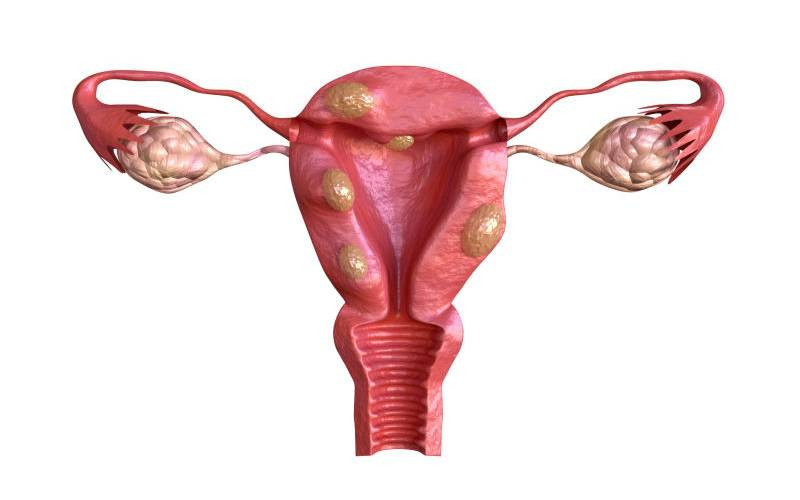
He says that about 40 per cent of fibroid cases are found to have a chromosomal (genetic) abnormality of varying types.
"The single most common factor underlying the above situations is the high levels of the hormone called oestrogen which is the single most important factor for their occurrence and further growth," Dr Raute states.
"Multiparity (the higher the number of children a woman has delivered) confers some protection against them," he adds. "This is not to say that getting pregnant when one already has the condition will give a cure (as is commonly believed and frequently asked). On the contrary, fibroids will experience more rapid growth during pregnancy as the uterus enlarges with increasing fetal size; hence they may become more symptomatic, especially in terms of pain. They will, however, shrink after delivery almost to the pre-pregnancy sizes usually within six weeks following the delivery," Dr Raute says.
According to Dr Raute, the majority, up to 75 per cent of fibroids are asymptomatic -- meaning the woman will experience no problems at all and may not even know she has them, only to be discovered coincidentally during an examination or evaluation for other issues.
He adds that symptoms will depend on three major factors; size (of the masses), number (of the tumors) and most importantly, the site (part of the uterus affected).
"These will range from painful menstruation (dysmenorrhoea), painful sexual intercourse (dyspareunia) or persistent lower abdominal or pelvic pains present throughout," Dr Raute says. "Bleeding can be heavy menstrual flow, prolonged menstrual duration and too frequent menstruation (too short, irregular cycles). At worst, the bleeding may be continuous, almost every day with risk of severe anaemia, heart failure and even death," he states.
He adds that another sign of fibroids is fertility challenges which is almost the biggest single societal problem caused by fibroids. Another symptom is compression of the urinary bladder hence the frequent urge to pass urine.
After diagnosis
Ivy narrates that a friendly gynaecologist informed her that she needed to undergo a myomectomy, a procedure in which a surgeon removes the fibroids but preserves the tissues in the uterus so that a woman could get pregnant in future if she wanted to.
"I had never gone through any surgery in my life so this really stressed me up," Ivy recalls. "At this time, I was around 23 years -- still young, you know."
When she called her parents, she informed them of the results and the recommendations from the medics. They told her that surgery was out of the question because they were afraid it would affect her fertility.
"They told me that all I needed to do was to go back home where an experienced herbalist who would sort out my issue immediately and that I would recover after only a few days. I accepted and went back home knowing there was a solution from my parents," Ivy says.
"After taking litres of herbal remedies, they didn't work. One day in the middle of the night (this was in 2019), I felt unwell. I can't explain it. I was having painful abdominal pains, I was facing trouble emptying my bladder and to make matters worse, I started bleeding more than I used to. I was bleeding so much, it was like water overflowing from a full tank," Ivy says.
She called her parents who were away from home at that time. She was taken to hospital in an ambulance and she was admitted to a private health facility.
"They checked my blood levels and noticed that I had lost a lot of blood (I had 3g/dl which is very low). I went through a blood transfusion and after the gynaecologist came to see me in my bed, he advised that I go for the myomectomy that I had declined earlier. However, I had to recover from the blood loss first," Ivy narrates.
She says that after the surgery, it took her a month to recover. And although all 32 fibroids were removed during the surgery, three weeks later, five new fibroids appeared. She was advised to go to another surgery but she could not afford it.
"After another three weeks, I took another ultrasound sound. The fibroids did not exist! They had shrunk leaving some scars," Ivy says.
She adds that although she has never experienced the degree of pain she experienced in the early years, she is still troubled by an irregular menstrual cycle and the possibility that the fibroids could recur.
"I worry about the small fibroids that were not removed during the surgery. I wonder if they will grow and give me sleepless nights," Ivy says.
She says the condition has affected her romantic life because of the stigma around it. She says the government should spread awareness of this condition because it is misunderstood.
"I tried to be in a relationship but after breaking news to my boyfriend that I had fibroids, he told me that women who have this condition have low chances of conceiving even if they go through surgery. It lowered my self-esteem so much, for a long time, I didn't want to get married," she explains. "The fibroids make sex so painful. In this world, no single man can live with you if you don't provide sex. It's a conjugal right," Ivy says.
"My age mates from college have their children but here is Ivy with no single kid in the house. Sometimes it stresses me up but what can I do? I did not call this monster to dissect in my life. I just found myself having it. I wish to have a baby who can call me mom, but I believe one day I'll have confidence and be in a relationship so that I can at least have my own children with a responsible father," she says.
"I was stigmatised because most men have little knowledge about it. Apart from educating the public, the government and concerned stakeholders should install enough gynaecologists who will care for and counsel women with fibroids," she says. "Let's understand the facts surrounding this condition to avoid misinformation," she concludes.
 The Standard Group Plc is a multi-media organization with investments in media
platforms spanning newspaper print
operations, television, radio broadcasting, digital and online services. The
Standard Group is recognized as a
leading multi-media house in Kenya with a key influence in matters of national
and international interest.
The Standard Group Plc is a multi-media organization with investments in media
platforms spanning newspaper print
operations, television, radio broadcasting, digital and online services. The
Standard Group is recognized as a
leading multi-media house in Kenya with a key influence in matters of national
and international interest.


